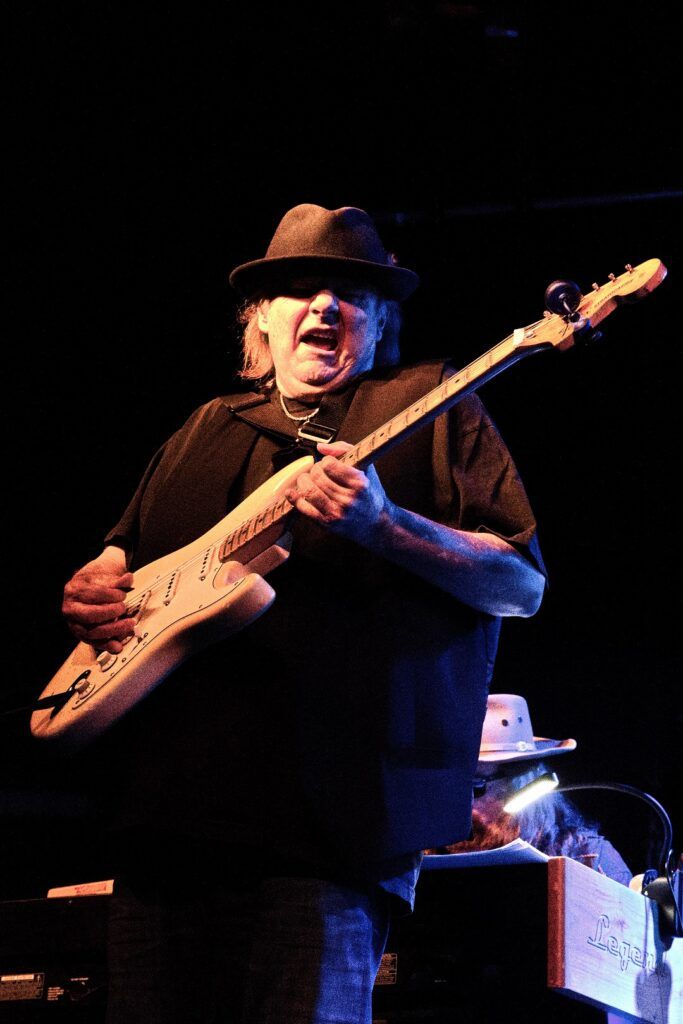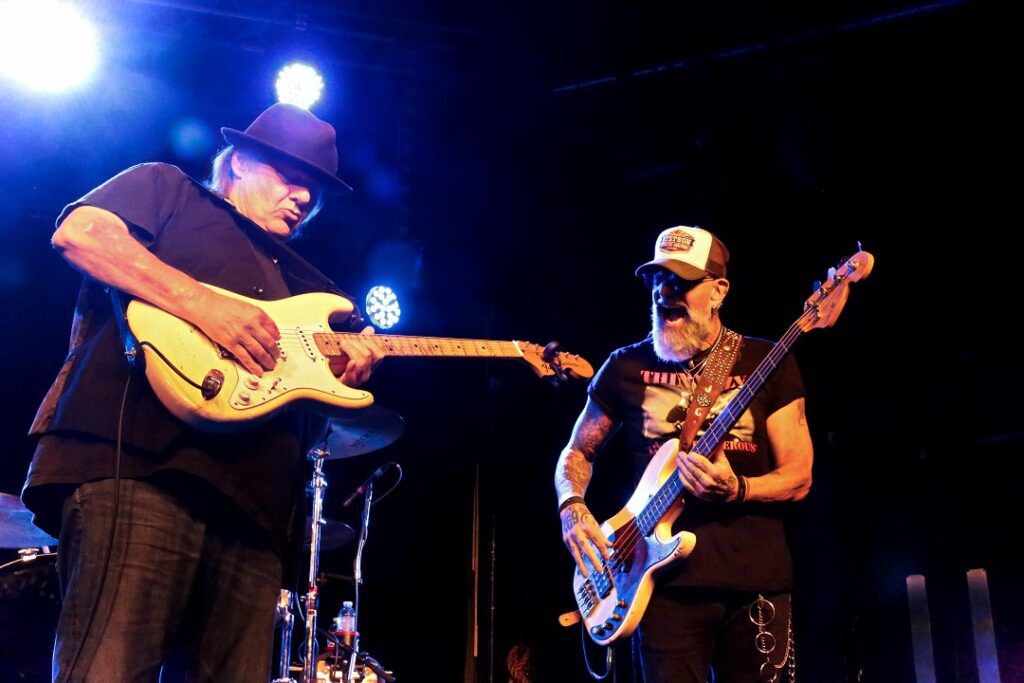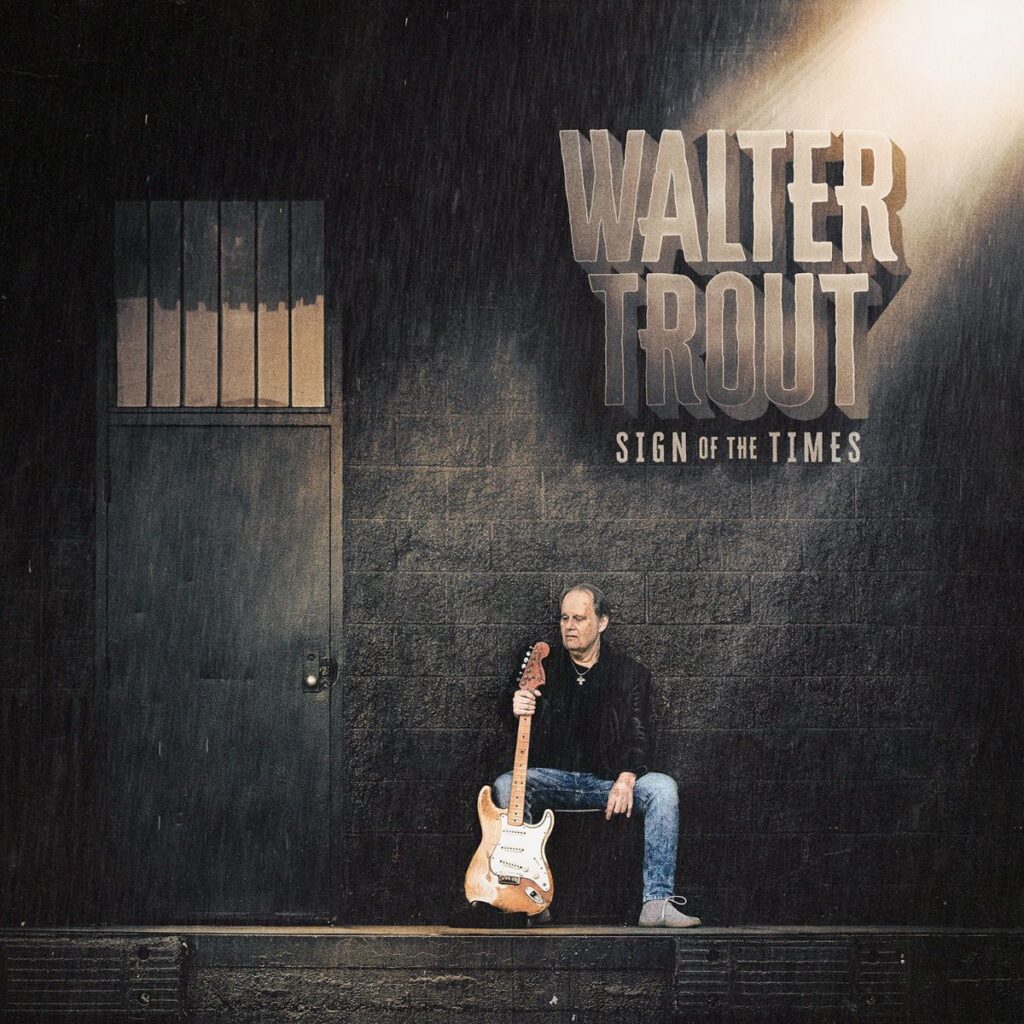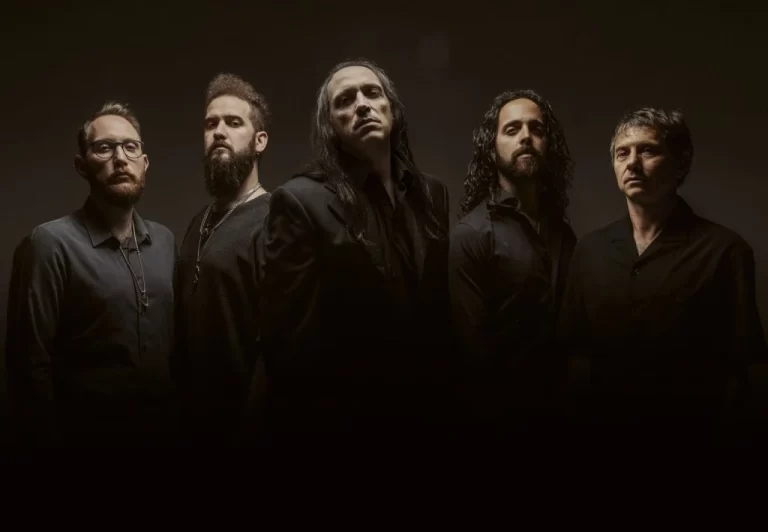Ah man, I love having the opportunity to speak with Walter Trout. One of those rare artists whose passion and enthusiasm for the form remains entirely undimmed, when you chat to Walter he gives no hint of his remarkable back catalogue or even his age, instead, he chats happily about his wife, his band, and his latest album as if it’s the first thing he’s ever released. Even when the subject matter gets heavy, as it can sometimes do, you laugh a lot, you learn a lot, and you come away feeling somehow brighter from the experience.
Tonight, we’re catching up over Zoom to discuss Sign Of The Times, an absolutely stunning record that finds Walter on fiery form. A blistering album – home to some of Walter’s hardest edged songs (“we’re not going to win any blues awards with this one” he laughs) – it is also deeply compassionate, with Walter seeking to unite when so many are intent on division. It is, quite simply, a masterpiece and it is hard not to betray my enthusiasm when trying to ask about it…

Phil?
Yeah!
How are you doing Phil?
I’m very well thank you.
Where are you calling from?
Leicester, in the Midlands
Home of Richard III, huh?
It is – and it’s also just up the road form where I saw you play for the very first time back on the Luther’s Bluestour.
Oh man, that’s a while ago! Yeah, OK. Well, I’m still going man!
It’s such a pleasure to speak with you again – it’s always really exciting to see that you’re releasing album and you’re recent run has been particularly exciting for me, because it feels like you’ve been taking us on a journey; from the catharsis of your immediate post-illness period, through Ride which was more introspective, but now it feels like your attention has shifted outwards.
That’s very insightful of you because I actually – I’ve done a couple of interviews, and they’ve said to me “well, what was different with this one?” And I said, after my transplant, I started making records again, I was looking inward. You know, Ride was about the shit that I went through as a kid. Ordinary Madness was about how the stuff I went through as a kid fucked me up. Broken was about how, after I got fucked up, I became a heroin addict, you know? And they were all looking inward. And I think, on this one, Marie is my songwriting partner, and we decided to look outward now – to take a look at what’s going on in the world. It’s a dark time.
It is, and I think it’s a difficult to do, to look out and, particularly when the world is a more challenging place, and to find a route that’s a reflection of what’s happening without necessarily preaching to people about what they should be doing. It feels like a very compassionate album.
Well, thanks. I didn’t want to… She and I decided, let’s take a look around here and let’s try to remark about it and reflect upon it but not contribute to the division if we can help it. There’s enough division, especially in my country right now – there’s two warring sides, you know. Let’s not contribute to that, but let’s see if we can take a look at it. She wrote the lyrics to Sign of The Times for example and that last spoken bit, “when democracy sours, we try to find our place, but contradictions devour when lies are commonplace” – that could be either side. All the politicians, right?
“And Big Brother and greed, they get all the glory, and we find ourselves written out of the story.” Now, who can argue with that? [Laughs]
I like that perspective because it’s a nuance you don’t see in, say, social media. It felt to me like the album treads that line – it’s not polarising – and it reflects the liner notes you had in Broken, where you said you still believe in the power of music, and you still believe in love. And, if this album had a tag line, I think it would be that.
Yeah, and that’s the truth, you know. I have to… I have to hold on to hope or you can sink into an abyss of despondency, do you know what I mean by that [I nod]. So, you have to hold on to hope and I know we’ve been through… I made it through the 60s, I was a teenage and there was the civil rights movement, the assassinations, the Vietnam war, and the national guards shooting down students in Ohio, and we’ve been through shit before. Sometimes it doesn’t make it easier to go through it, but you have to hold on to some sort of hope for the future, otherwise, you just pack it in, right?

It’s funny that you mention Ohio, just because one of the cornerstones that I felt maybe emerged a little bit on this album was some really grungy guitar, kind of Ragged Glory-era Neil Young. And I don’t know if that was anything you were challenging, but it was a great tone and a great sound if you want to get some frustration out.
Yeah, and I have to say, I produced this one myself after doing fifteen albums with the same producer. This was again my wife, she said “Walter, you don’t need a guy to sit there and say, ‘play that solo again!’ You know, if you play a solo and you like it, that’s good enough. And you don’t need someone to say, ‘well, your guitar needs to be cleaner.’” Well, maybe it doesn’t! Maybe it needs to be dirtier. So, I decided to give it a shot. It was kind of like, I also decided I wanted to get some different guitar sounds on here. I wanted to work, for example, on Hurt No More, I almost had Mark Knopfler in my head with that one. And I didn’t go quite as clean as his, but I did clean up the tone a lot, and I played simpler licks like him. And then, on Sign of The Times, with the lyrical content that Marie wrote, she wrote the lyrics, I said to the band, “I have in mind, like, Rage Against the Machine here. Let’s not worry about B.B. King, let’s go be Tom Morello here”.
So, it was really cool experimenting with different guitar sounds for each song, you know.
That’s so much fun. Sign Of the Times – I was kind of stunned by how heavy it was and when I was listening, I heard – not Rage, but the same guy – Audioslave, with that huge, almost Zepplin-esque tone you had going there.
You know, what’s funny with that, when we did the song and, believe it or not, I wrote that on an acoustic guitar. I also wrote Struggle to Believe on an acoustic guitar but, when the band came over to rehearse and I played them Sign of The Times on the acoustic, they were all sitting there and looking at me, I said “you know what, let’s be Led Zeppelin here.” And I said to Mike, the drummer, “your main guy’s John Bonham? I want you to be John Bonham here, and I’m going to get the biggest, nastiest guitar sound that I can find here. And that sound needs to match the lyrics.” The lyrics – it couldn’t be a quiet, gentle tune. You know? It needed to be angry, and pissed off, and it needed to slap you in the face. And I think it does, you know.
It does, and it’s something that you touched upon in the lyrics to Artificial, there are so many bands that are processing everything – the music’s quantised, it’s all in perfect time, the vocals are processed, if they’re playing live, it’s all set against perfectly lined up images on a big screen, and the end result is you just feel numb. It’s horrible. This album, it’s got that rawness, that rock ‘n’ roll energy and you miss it, because so much seems to have been sandpapered down.
Yeah, I know! And bland. I refuse to do that. We rehearse the tunes and, as we play them in the garage, they evolve – you know? But then we go into the studio, and we pretty much do them live. We’ll go back and work on some stuff. For example, I remember, I think I did four rhythm tracks on there, there’ll just be a chord come in now and then. I really worked on producing that song to make it big. But something like Sign of The Times, we pretty much did that live and then I went back and put a rhythm guitar track behind the solo, because it needed to be big. So, when we’re playing it live, and I play the solo [sings it], when that drops out, I was like “no, it has to have that”. So, I put a rhythm track on that. But that kind of stuff, we pretty much go in there and do it live. I like studios that have a big room, we set up, and we face each other.
It’s like Dave Gilmour said. It’s like you can almost lean back into the sound of the amp roaring behind you – nothing matches that! And that’s what… when everything’s really heavily compressed and tidied, you lose that snarl.
Yeah, it’s the truth. Now, I did, in my search for some different sounds on this one, I purchased a thing – I don’t know if you’re aware, but there’s a guy in Germany named Thomas Blug, and he has a company called Blug Guitar, and he makes little guitar amps that are this big [holds hands apart], but they have a tube in them. And he has one and, on No Strings Attached, I took this guy’s little, 100watt tube amp, which is this big, you can carry it in your backpack, and I plugged that through my Boogie cabinet. And then, I’ll be honest, I put a fucking Uni-vibe in front because I’d been listening to Robin Trower, right? But I wanted a different sound and not “here’s Walter with his Mesa Boogie again”. So, if you listen to that, the guitar sound on No Strings Attached, it’s very different to anything I’ve done. It’s like, I want to do something different here, not the same – here’s Walter, ten more songs, and the thing sonically sounds the same because I’ve had the same guy mix my last fifteen albums. No! Let’s do it differently. And I’m really happy with it. [laughs]
I read an interview with you, relatively recently, and I found it brilliant that you dial in a death metal setting on your Boogie and that’s how you get your gritty tone.
Well, with Mesa Boogie, when you get your amp, you get a manual and, in the back, they have suggested settings. And I do set [chuckles] I do set my Boogie for death metal. It’s all gain, man! That’s it. Gain’s on ten!
The album – one of the things I love about it is that there are these songs with this anger and there are songs that are more melancholic. And then, right in the middle, you’ve got High Tech Woman, which is really fun, and it feels like you had a lot of fun jamming on that in the studio.
I did, and the guy playing guitar with me on that is Jimmy Vivino, who kind of plays with everybody now. But, for many years he was the band leader on the Conan O’ Brian TV Show. And he came out of Southside Johnny and the Asbury Dukes – that was his band – he came in and we just jammed it live in the studio. We had a good time, but that one came about because I was trying to do something on my phone and I’m really cyber-stupid. I refuse to educate myself with it. I’m too old, I don’t want to know this shit. I’ve got enough mental problems trying to figure out this stuff with technology. But I’m trying to do something and [mimes frantic hammering on an imaginary keypad] … and my wife said, “what’s the problem?” and I told her it was the phone. She said, “give me it…” and she did it in about 30 second and handed me back the phone. I said, “thank god I’ve got a high-tech woman!” And my brain went “oooh, there’s a song!”
That kind of spontaneity and that quirkiness really lends itself to the looser vibe of the music.
Yeah, and those lyrics – they’re pretty ridiculous, you know [laughs]. I had a bunch of lyrics that I didn’t put in there like, both my parents when they died, they had dentures, you know – they grew up in the 20s and 30s. And one of the things I still have from both of them is their teeth! [Laughs] So, one of the lines was “I’ve been east, west, north, and south, but I’m going to die with all my teeth in my mouth”. And I didn’t put that one in there, you know. And my mom, who was an English teacher, I knew when I wrote “I am what I am and I ain’t what I ain’t…” To her, that would be like scratching a blackboard with your fingers [imitates old lady’s voice] “you can’t say that, Walter!” She was a grammar person, you know. I had fun with that song. It was a little bit of levity in the apocalypse of the rest of the record, you know? [Laughs]
You do need that, though, don’t you? That leavening of the mood. It’s difficult sometimes to see that hope and to see that joy, but we’ve discussed the before I’m sure, but blues is surely about bringing joy form the darkest times and bringing people together.
Yeah, and I don’t. I can tell you this and it’s in the press release, after we did Sign of The Times, and we went in and sat down and listened to the track – we sat there and Teddy, the keyboard man, he said “well Walter, you’ll not be winning any blues awards with this record!” It’s the least bluesy record I’ve done, you know. And that’s OK.
Here’s the thing, man. You go on YouTube now, and there’s a ten-year-old playing Eruption. And then there’s a twelve-year-old playing like Yngwie Malmsteen and then there’s an eight-year-old Asian kid who sounds like B.B. King. And if you type in “guitar lessons” – like Eric Johnson guitar lessons, there’s twenty-five guys who can play just like Eric Johnson. And I realised that great guitar players are a dime a dozen now. They’re all over the place. So, what I really want to concentrate on is playing less and saying more. And I’m also really concentrating on being a songwriter that also plays guitar. And that’s what I tried to do with this record, be a songwriter.
It’s an interesting journey, but it’s also so important because it’s easy to be in thrall to technicality, but most of my favourite artists were, I guess, kind of sloppy (in the best possible way) – like Kurt Cobain, or Sonic Youth, or Neil Young…
Neil Young! I LOVE Neil Young, man. I’m a huge Neil Young fan and when he starts splaying, you’ve either got to love it or you’ve got to get out of the room, man. I just saw a clip of him some years ago with Pearl Jam doing Rockin’ in The Free World and his solos are wow! You know who it is immediately. He’s not Al Deemiola, he’s not fucking John McLaughlin, but he’s got something to say, man, and that’s what I want to be. I want people to listen to those solos, and I want those solos to tell a story.
Again, that’s one of the things that attracted me to your music in the first place – from Luther’s Blues (which was my first album of yours), there’s so much emotion wrapped up in the sound and, also, the way you use space between the notes; I mean, what you don’t play is as important as what you do, right?
Yeah, I’m only going to be so technically good because all my life I’ve had what’s called essential tremor, and I shake. So, not only have I had that all my life, where my hands shake, but now the liver drugs that they have me on, the immune suppressants, the side effect is that you shake. So, I’m like this all the time [shows me his hand shaking] and I have a difficult time controlling my picking hand. It’s doing this a lot, so there’s a lot of things technically I can sit down and work on day after day after day and I don’t get it. Because I can’t control this hand. And so, I just have to play the way I play and hopefully it will speak to somebody. It’s about feeling.
I described the album earlier as being very compassionate but I guess it is a challenging subject area to approach.
You know, I’m very happy with this record. It’s hard. I know that some people are going to like it, some people are going to hate it. Some people who are sort of more blues oriented are going to hate this record. And that’s OK. I even have a song from years ago that I’ve never recorded called You Can’t Please ‘Em All. I mean, I have a dear friend, he’s gone now, but he hated The Beatles! And I was like “how can you hate The Beatles, come on!” And he goes “I hate the fucking Beatles!” And I said, “well, I guess they can’t please them all either!”
All I can do, Phil, is to try to do what to me is the best and the most honest I can be in what I present and, if I’ve been honest and I feel like I’m not lying to anybody and I’m not bullshitting anybody and I’m not putting on a façade, then I can do that work and I can look it and go “OK, I’m alright with that and I don’t have a problem with it.” Some will like it, and some won’t – you know – but that’s all I can do. If I can look in the mirror and go, “that’s the best I have to give them and I was honest, I hope they like it.” But I have to feel like I’m alright with what I did.
To return to Neil Young for a moment, there’s that great quote – great art is giving people what they need, not what they want, and I guess that’s what makes music art and not just commerce, right.
Yeah! Not just commerce, what a great, great quote there man. I never thought of that, but yeah, I don’t want it to be commerce. And I’m not in this for tonnage. I’m not like “well, if I do it like this, I’ll sell more records.” No, I don’t give a fuck. I have to do it honestly from my gut and then there it is, man. And I’ve got to say, I had a great team. The guy that mixed this album. First the guy who record it – Thomas Ross Johanson – he did an incredible job recording. That big fat guitar sound on Sign of The Times, I said, “I want this thing to sound like Thor’s hammer or something”. And we worked on it, and we set the amps a certain way and we set the mics a certain way. And then, the guy that mixed it is a guy named J. J. Blair – look him up, he’s a genius and he did that whole record in three days. I was just floored – floored – when he sent it to me. Because he not only mixed it and made it sound huge, but he also added a vibe to every song. Like, on No Strings Attached, whatever he did to my voice, he added to the vibe of the song. And I think if I’d been with somebody else, they’d have not wanted to do that, but J. J. just did it and said, “here it is” and I was like “wow!”

It’s great having that extra pair of ears. Music is one of those rare art forms where there’s so much collaboration, and that’s what creates, you know, the sound in many ways. It’s very cool, I think, and very exciting as well.
Yeah, I do too. And I gotta say, the players rose to the occasion. You’ll kind of appreciate this – Struggle to Believe. I called J. J. when he was starting to mix and I said, “look J. J., there’s a song on there and when I wrote it…” I kinda had in mind that I wanted to write a Who song, a Pete Townsend song, and even in my head I can almost hear Roger Daltry singing it. And I said to J. J. on the phone, “I have this song and I kind of want it to sound like The Who, but they had Mick Taylor or Jimi Hendrix on guitar playing leads, and I want it to sound like that.”
And he said, “well, I did three albums with The Who and I was their keyboard player for a while, so I got it.”
And then, I asked him, “do you remember Live at Leeds? Do you know that album?”
Because, you know, there’s a song called Young Man Blues and, in the middle, they just go free form. They free-form jam and they’re all playing solos at the same time, and on Struggle to Believe, the band in the studio asked what they could do in the middle, and I wouldn’t tell them. I told them we were going to jam and see what happened!”
So, anyway, if you listen to the jam in the middle, I just hit a low note and let it ring. I’m waiting to see what happens. The bass player kind of, you can hear him, he’s not really doing much. And then the drummer comes in with this jungle beat and then you hear me and the bass player go “oh, we get it! That’s where we’re going!” And we start playing along with him, and then Teddy on the keys gets in there. And it was completely spontaneous, free-form, and then we’re jamming and they’re looking at me like, what do we do now? So, I just sang like the first line of the last verse, I sang it and looked at them, and then they came in with the song. But it was exciting man! So, what you hear on there is exactly what we did live. I said, “look, we’re going to put it on there, if we fuck it up it is what it is! I want it to be experimental and whatever we get, we’re going to put on there!” So, I put it all on the line there and they came through wonderfully.
That’s pure punk rock, that’s so cool – I love that.
Yeah, it was exciting man! And I gotta say, when we finished the song, and we stopped, I was kind of like [mimes mopping brow]. I was shaking man [laughs].
That’s amazing dude. Thank you so much for spending this time with me, it’s been so cool catching up with you.



